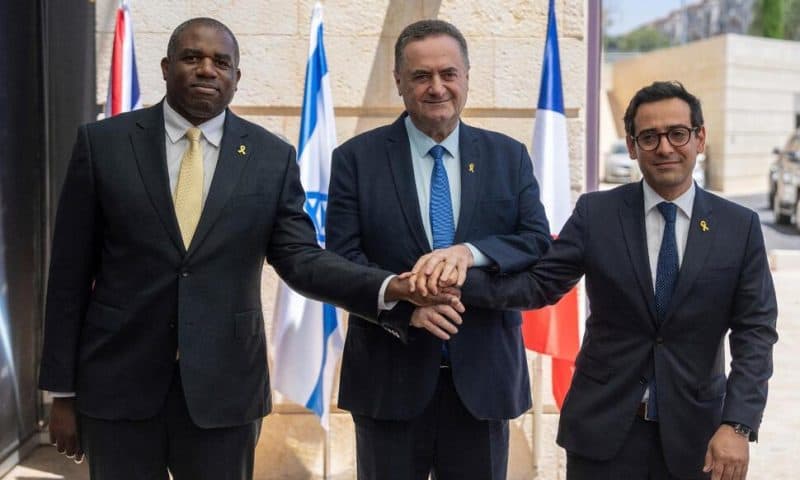The U.K. government says it’s suspending exports of some weapons to Israel because they could be used to break international law
LONDON — U.K. Prime Minister Keir Starmer’s government said Monday that it’s suspending exports of some weapons to Israel because they could be used to break international law — a move with limited military impact intended to increase pressure by Israel’s frustrated allies for an end to the war in Gaza.
Foreign Secretary David Lammy said that the U.K. government had concluded there is a “clear risk” some items could be used to “commit or facilitate a serious violation of international humanitarian law.”
He told lawmakers the decision related to about 30 of 350 existing export licenses for equipment “that we assess is for use in the current conflict in Gaza,” including parts for military planes, helicopters and drones, along with items used for ground targeting.
The decision wasn’t “a determination of innocence or guilt” about whether Israel had broken international law, and wasn’t an arms embargo, he said.
Israeli Defense Minister Yoav Gallant said on X: “Deeply disheartened to learn of the sanctions placed by the U.K. Government on export licenses to Israel’s defense establishment.
The United Kingdom is among a number of Israel’s longstanding allies whose governments are under growing pressure to halt weapons exports because of the toll of the nearly 11-month-old conflict in Gaza. More than 40,000 Palestinians have been killed, according to the health ministry in the Hamas-run territory, which doesn’t distinguish between militants and civilians in its toll.
Sam Perlo-Freeman, research coordinator for the group Campaign Against Arms Trade, said that the announcement was “a belated, but welcome move.” But he said that it was “outrageous and unjustifiable” that parts for F-35 fighter jets weren’t among the exports being suspended.
The government move comes after two groups, Palestinian human rights organization Al-Haq and the U.K.-based Global Legal Action Network, filed a legal challenge aimed at forcing the U.K. to stop granting any licenses for arms exports to Israel. The case has yet to go to a full court hearing.
Dearbhla Minogue, senior lawyer for the Global Legal Action Network, said the government’s “momentous decision vindicates everything Palestinians have been saying for months.”
The U.K.’s center-left Labour government under Starmer, elected in July, has faced pressure from some of its own members and lawmakers to apply more pressure on Israel to stop the violence. In the election, the party lost several seats it had been expected to win to pro-Palestinian independents after Starmer initially refused to call for a cease-fire following Israel’s retaliation after Oct. 7.
In a departure from the stance of its Conservative predecessor, Starmer’s government said in July that the U.K. will not intervene in the International Criminal Court’s request for an arrest warrant against Israeli Prime Minister Benjamin Netanyahu.
Starmer also restored funding for U.N. Palestinian relief agency UNRWA, which had been suspended by Conservative Prime Minister Rishi Sunak’s government in January.
Lammy, who has visited Israel twice in the past two months as part of Western efforts to push for a cease-fire, said that he was a Zionist and “friend of Israel,” but called the violence in Gaza “horrifying.”
“Israel’s actions in Gaza continue to lead to immense loss of civilian life, widespread destruction to civilian infrastructure, and immense suffering,” he said.

